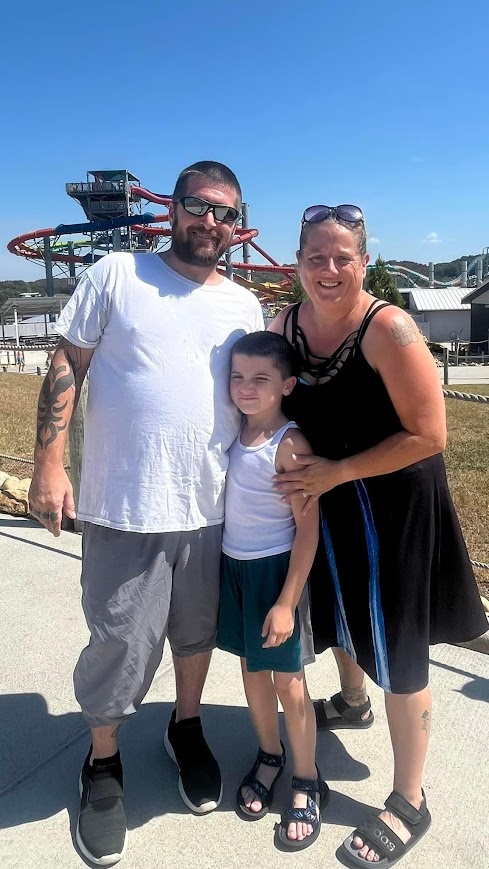

Today we’d like to introduce you to Jennifer Rose
Hi Jennifer, so excited to have you on the platform. So before we get into questions about your work-life, maybe you can bring our readers up to speed on your story and how you got to where you are today?
Our seven-year-old son was diagnosed with Autism and comorbid conditions in late 2020. As new parents navigating this diagnosis, we sought ways to support him and educate ourselves about his disabilities. We enrolled him in the Regional Intervention Program (RIP) through Helen Ross McNabb, which applies the principles of Applied Behavior Analysis (ABA) to work with parents, caregivers, and children. I became deeply invested in the program, and my experience with William inspired me to pursue a career in this field.
His case manager was invaluable, providing guidance through the program and offering resources and knowledge that supported William’s development. This experience led me to explore a career in Applied Behavior Analysis. I began coursework to become a Registered Behavior Technician (RBT) and simultaneously started my college journey. After earning my RBT certification, I began my career with Positive Behavior Supports while pursuing a Human Services Certificate in Child and Family Services from Purdue University.
With the support of my supervising Board-Certified Behavior Analysts (BCBAs) at PBS Inc., I realized my goal of becoming a BCBA. After obtaining my Human Services Certificate, I pursued a Bachelor of Science in Psychology with a focus on Applied Behavior Analysis, graduating recently. I then immediately started the Master of Science in Applied Behavior Analysis program, with an anticipated graduation date of October 2025.
Over the past three years, I have worked as an RBT and student analyst in the ABA field. Concurrently, I began advocating for changes in local and state education policies on a volunteer basis. Our family quickly learned the intricacies of Individualized Education Program (IEP) meetings and the importance of parental advocacy for necessary services. As a professional, I questioned why Knox County School District did not allow outside ABA therapists and other medically necessary services into schools. Along with other parents, I advocated for policy changes, and in June 2023, we succeeded in getting a policy approved that permits outside therapists in schools.
Our advocacy efforts continue, focusing on the special education department at the local level and pushing for changes at state and federal levels. In addition to advocacy, my husband, son, and I hosted a billiards tournament to raise awareness and educate others about autism, mental, behavioral, and neurodevelopmental disorders, and support networks. The first year’s proceeds were donated to the Autism Society of East Tennessee, and the second annual tournament in April benefited the Smoky Mountain Autism Success Hub (S.M.A.S.H.).
During this time, we have offered families resources across multiple areas, assisted in special education with a focus on the Individuals with Disabilities Education Act (IDEA) and the Americans with Disabilities Act (ADA), and supported parents in navigating applied behavior analysis (ABA) therapy. In October 2023, I was elected as the East Tennessee Student Representative for the Tennessee Association of Behavior Analysis (TABA) and appointed Chair of the Webinar Committee in November 2023. In August 2024, the governor of Tennessee appointed me to the Tennessee Autism Spectrum Disorder Council, where I serve on four committees.
As a professional and parent in the ABA field, I understand the importance of proper dissemination of ABA practices and advocate for it. During a fundraiser event for SMASH in April 2024, discussions with the director highlighted the need for similar organizations in other areas of East Tennessee. With support from my husband, colleagues, friends, and the directors of SMASH, we founded LIFT East Tennessee, a 501(c)(3) nonprofit organization.
Can you talk to us a bit about the challenges and lessons you’ve learned along the way. Looking back would you say it’s been easy or smooth in retrospect?
Throughout this journey, we have encountered numerous obstacles and challenges. Neither my husband nor I had an educational background or in-depth knowledge of the Individuals with Disabilities Education Act (IDEA), nor did we have the financial resources to assist us. Given our son’s need for one of us to be available at all times, we made the decision for my husband to become the stay-at-home parent. It was more practical for me to continue my education and pursue my goal of becoming a Board-Certified Behavior Analyst (BCBA), as I wanted to gain field experience while working to improve the quality of life for others.
We are grateful for the support of our case manager in the Regional Intervention Program (RIP). Initially, we felt lost, and despite extensive online research, clear guidelines and accessible resources were hard to find. We recognized that parents should not have to navigate these challenges alone, as they already have enough to manage.
Transitioning from a two-income household to a single income posed significant financial challenges. Additionally, taking time off work further complicated our financial situation. We also faced judgment from others when we accepted and acknowledged our son’s disabilities, particularly his Autism. This judgment came not only from acquaintances but also from friends and family. My father and stepmother dismissed autism as a valid diagnosis, attributing it instead to poor parenting. Consequently, my father has distanced himself from both his grandson and me, maintaining minimal contact with his granddaughter and now his great-grandchild.
We dedicated hours to researching laws, policies, and relevant information to navigate this unfamiliar territory. We experimented with various approaches; some were successful, while others were not. We reframed these experiences not as failures but as learning opportunities that guided us in our journey.
When we decided to establish our nonprofit, we recognized the inherent risks, particularly given our financial situation. However, we firmly believe in our mission. LIFT East Tennessee was initiated without startup funds, relying instead on our personal finances. We continue to support the organization financially, which has intensified our economic difficulties, as we now live paycheck to paycheck and struggle to make ends meet each month.
Thanks for sharing that. So, maybe next you can tell us a bit more about your work?
I currently hold several positions, most of which are volunteer roles, in addition to serving as the Executive Director and Founder of LIFT East Tennessee. I work in the field of Applied Behavior Analysis (ABA) as a behavior specialist, providing ABA therapy to children and adults with autism and other mental, behavioral, and neurodevelopmental disorders, along with their support networks. My services are delivered in various settings, including clients’ homes, communities, schools, and clinical environments.
In addition to my role as a behavior specialist, I am actively involved in several volunteer positions. I serve as the Chair of the Webinar Committee and the East Tennessee Student Representative for the Tennessee Association of Behavior Analysts. Furthermore, I am an appointed member of the Tennessee Council on Autism Spectrum Disorder, where I participate in four committees: the Healthcare Committee, Early Intervention and Education Committee, Aging and Adulthood Committee, and Advocacy and Communication Committee.
Two accomplishments that I am particularly proud of include the opportunity to collaborate with many individuals to effect change and promote inclusion for individuals with disabilities, thereby enhancing their quality of life. Additionally, I take great pride in witnessing my son apply what he has learned to support the work I am doing. At seven years old, he has participated in multiple interviews with various news outlets advocating for change, spoken at a school board meeting, and is always the first to offer assistance to another child or adult in need.
What sets me apart is my determination, resilience, and commitment to standing up for what is right, even when the risks are significant. In the field of Applied Behavior Analysis, we are held to high ethical standards, which I deeply value as they ensure we provide ethical and effective treatment while safeguarding the well-being of our clients and caregivers.
Risk taking is a topic that people have widely differing views on – we’d love to hear your thoughts.
My perspective on risk-taking is multifaceted, informed by both my personal and professional experiences. I believe that calculated risks can lead to significant growth and opportunities, particularly when they are aligned with a meaningful mission. In my journey as the Executive Director and Founder of LIFT East Tennessee, I have encountered situations where taking risks was essential for driving positive change for individuals with disabilities.
One major risk I took was founding LIFT East Tennessee itself. At the time, my husband and I were navigating financial challenges and uncertainties, but we recognized the urgent need for an organization that could support families like ours. We had to invest our personal resources to get the organization off the ground, which was a significant financial commitment. However, I believe in our mission to enhance inclusion and improve the quality of life for individuals with disabilities. This belief motivated me to take that leap, despite the potential for setbacks.
Another notable risk involved advocating for policy changes within the education system. As I collaborated with other parents and local officials to allow outside ABA therapists into schools, we faced resistance and skepticism from various stakeholders. Engaging in this advocacy work required a willingness to confront difficult conversations and challenge the status quo. The potential for failure was real, but I viewed this effort as vital for ensuring that children receive the support they need.
Additionally, my journey toward becoming a Board-Certified Behavior Analyst (BCBA) involved stepping outside my comfort zone. Balancing my education, work responsibilities, and family commitments required me to navigate significant challenges and uncertainties. This experience taught me that while risks may be daunting, they can lead to personal fulfillment and professional advancement.
Ultimately, I see risk as an inherent part of pursuing meaningful goals. It involves weighing the potential benefits against the possible consequences, and I have learned to embrace uncertainty as part of the journey. While I do not view myself as a reckless risk-taker, I recognize the importance of stepping outside of my comfort zone to advocate for what I believe in and to create opportunities for others. Each risk I have taken has contributed to my growth as a professional and a parent, reinforcing my commitment to making a difference in the lives of those we serve. I recognize that not every risk will yield positive outcomes, but each experience contributes to my development and strengthens my resolve to advocate for others.
Contact Info:
- TikTok: https://www.tiktok.com/@lifteasttennessee
- Facebook: https://www.facebook.com/share/g/VHnDes5Xgwsu9RFb/
- Other: https://www.facebook.com/LIFTEastTennesseeCharitySales
















































